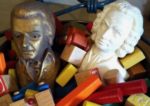Vintage PA: Amateur Exploration 2
 Yesterday”s wonderful post on amateur pianism by Fran Wilson, More Than Hobbyists, deserves some extra airtime.
Yesterday”s wonderful post on amateur pianism by Fran Wilson, More Than Hobbyists, deserves some extra airtime.
“…all the amateur pianists I have met and know play the piano because they love the instrument and its literature. Those of us who play at a semi-professional level, intermediate players, beginners, returners, “Sunday pianists” all share this profound passion. Eavesdrop on any conversation between members of my piano group and this love is more than evident as we discuss the myriad aspects of our craft: practising, repertoire, exams, concerts, performance anxiety, favourite professional performers and recordings.”
Here are my own humble thoughts on the subject, originally published last February. Enjoy!
Last Sunday, on the way back from our family reunion, I was listening to an episode of The Splendid Table wherein Lynne Rossetto Kasper interviewed Nigella Lawson. In her introduction, Lynne stressed that Nigella “takes great pride in being known as a home cook rather than a professional chef.” Nigella is currently a judge on The Taste, where home cooks and chefs compete equally.
I started thinking about all the language we use for amateur pianists. We say avocational players, amateurs, lifelong learners, and students. We even hear the term piano addict bounced around now and then. We rarely hear the term home pianist or community pianist. In fact, there are several sites and an increasing number of competitions solely for amateur pianists with amateur in their titles (and, like Nigella, proudly so.)
Despite amateur being the word of choice to describe the non-professional, it can have devastating connotations for some. So, I decided to do a little amateur exploration of my own and found quite the spectrum.
Amateur (Merriam-Webster):
1: devotee, admirer 2: one who engages in a pursuit, study, science, or sport as a pastime rather than as a profession 3: one lacking in experience and competence in an art or science
Here are some excerpts from Wikipedia. Of course, you can make the point that Wikipedia is by nature an amateur endeavor, but it does serve to put our finger on the pulse of general society. Oh, read on…
An amateur (French amateur “lover of”, from Old French and ultimately from Latin amatorem nom. amator, “lover”) is generally considered a person attached to a particular pursuit, study, or science in a non-professional or unpaid manner. Amateurs often have little or no formal training in their pursuits, and many are autodidacts (self-taught).
OK, I am a fan of “lover of” but it goes south really fast in the next paragraph. And, no formal training??? Really???
Amateurism can be seen in both a negative and positive light. Since amateurs often do not have formal training, some amateur work may be considered sub-par. For example, amateur athletes in sports such as basketball, baseball or football are regarded as having a lower level of ability than professional athletes. On the other hand, an amateur may be in a position to approach a subject with an open mind (as a result of the lack of formal training) and in a financially disinterested manner.
The stigmatization of amateurs as fools for contributing to society simply for the love of it can be explained by the amateur’s non-conformity to the ideological structure of consumption (Goffman, 1963; Stebbins, 1992). Amateurs are serious about the work they do, providing outstanding examples of contributions to society (Stebbins, 1992). But whereas professionals obtain licenses as their “measurability of the excellence of service provided” (Stebbins, 1992, p. 21), amateurs break taboos by loving their work. From here, it can be argued that, to the extent amateurs threaten the professional industry by providing free services, the professional industry has an interest in making its counterpart amateur activity shameful.
Threatening? I simply got nothin’… But, if I had, it would involve the opposition of terms like unproficient, bush leaguer, and dabbler to several synonyms for professional including ace, competent, crackerjack, polished, and well qualified. And, who says it’s wrong to love what you do anyway? Didn’t they just say the word amateur came from the French “lover of”?
Thesaurus.com lists the following synonyms for the word amateur. I appreciate the distinction between an amateur and a novice but how does apprentice (student) get lumped into the mix? (I feel the same about learner listed further down under amateurish)
Definition: casual participant
Synonyms: Sunday driver, abecedarian, apprentice, aspirant, beginner, bush leaguer, dabbler, dilettante, greenhorn, ham, hopeful, layperson, learner, neophyte, nonprofessional, novice, probationer, putterer, recruit, tenderfoot, tyro
Notes: an amateur is someone who pursues a study or sport as a pastime; a novice is someone who is new to a field or activity
Amateurish shows up in the listings for crude, inexpert, and incompetent.
Definition: unrefined, natural
Synonyms: amateurish , callow, coarse, green, harsh, homemade, homespun, immature, impure, in the rough, inexpert, makeshift, outline, prentice, primitive, raw, rough, rough-hewn, rude, rudimentary, rustic, simple, sketchy, thick, undeveloped, unfinished, unformed, ungraded, unmatured, unmilled, unpolished, unprepared, unprocessed, unproficient, unsorted, untaught, untrained, unworked, unwrought
It seems to me that the issue here is that the word amateur (a word with multiple meanings) is being applied broadly to a spectrum of, in our case, pianists. It isn’t meant to be individual or specific. There is a stereotype at work here. I have certainly known some people who fit the rank amateur part of the definition. They dabble at music willy-nilly as others do at craft projects. I don’t even award them amateur status.
I have known many more amateur pianists who are fine musicians and who continue to refine their skills, whatever the genre. These pianists contribute to their communities in many ways while excelling at their day jobs. They make music alone and with others. Among them are doctors, lawyers, business people, contractors, teachers, and stay at home parents.
The amateur pianists I’m talking about don’t lack competence. They are not coarse or shallow. They are not untaught or unproficient or any of the other negative things listed above. They simply are not categorized as professional musicians because they do not make a career of performing and/or teaching.
Music is a priority for them—a need. They may have full time day jobs. They may be full time students or be retired. They make room for music in their lives the same way they make time to exercise, eat, sleep, and take care of those they love. They understand the art that is music and all that it can contain. Also please note there is a difference between those who have careers in more than one area (paid gigs by night and a day job to make ends meet) and amateur or avocational pianists.
Let’s go back to the issue of amateurs threatening professionals. Certainly amateur teachers (those without thorough musical backgrounds) do threaten the professional teaching community. Beside hurting the general reputation of independent music teachers everywhere, they lower the expectations of students and families. They often stint the growth of those they purport to teach.
But what about the issue of avocational pianists threatening professional pianists? There is, in certain parts of the community a perception that musicians for weddings and special events don’t have to be paid. That has been chewed over quite extensively and I don’t feel the need to add fuel to the argument here. If you hire a professional, they should be paid at the going rate for the area. If you are cheap, and get someone to play on the cheap or for free food, you are going to get what you pay for. And yes, the cheapskates sometimes contribute to lowered expectations from the community.
Nigella talked about the fact that home cooks are becoming more and more skilled and don’t want to go to a restaurant and eat what they can make at home. This pushes professional chefs to make more and more complicated dishes. It actually raises expectations.
Do you suppose professional pianists are being pushed to expand their repertoire and their communicative skills in the same way? That might mean the world of piano, while perhaps smaller than in the past, is actually pretty healthy. Perhaps size doesn’t matter.
Do I teach my home pianists and future home/community pianists differently than my future professionals? Sometimes. Those who will be teaching and mentoring others need certain skills. On the other hand, music has meaning and the journey to that meaning, though personal, does not change depending on one’s amateur or professional status. My work as a teacher is not more or less important depending on their amateur or professional status either.



And that it what it’s all about!
Well put! It also applies to other kinds of amateur musicians. Like choir singers. My choir (top notch standard) is proud to be peopled by amateurs, who know that though sometimes they do a not-quite-so technically perfect job of the score, their commitment to the emotion in the music is alwasy fresh.
Thanks Mark! (and thanks for reading)
Your post is a great pair with “More Than Hobbyists!”